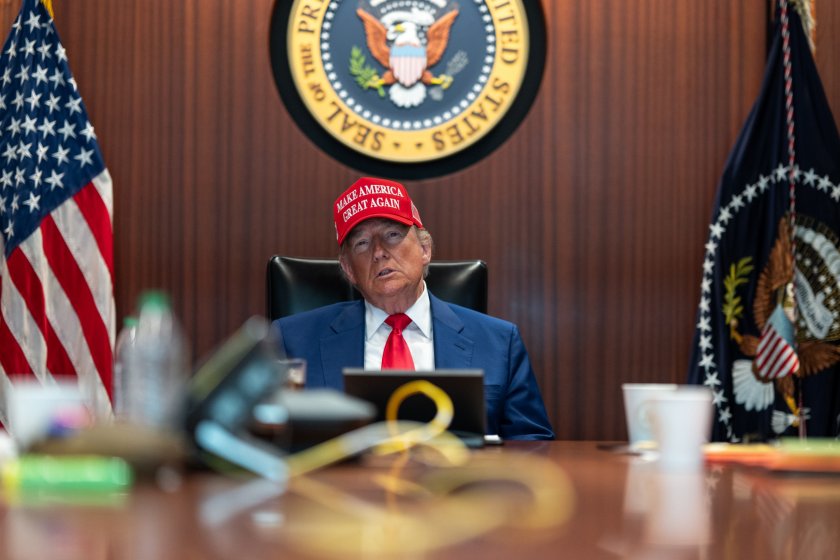It has got a lot harder to either break off or maintain Turkey-US relations
Unfolding Turkey-US relations undoubtedly encompass developments (due to the interweaving of many issues) in which everyone can find support for their own thesis.

Fotoğraf: Kayhan Özer/AA
The controversy with the US over Turkey’s purchase of S-400s brings fresh developments with each day that it continues. US Secretary of State Mike Pompeo, stating that Turkey’s activating the S-400s of which it has begun to take delivery would be “an unacceptable move,” commented on the current state of play by saying, “There could be more sanctions to follow but frankly what we'd really like is for the S-400 not to become operational.”
The crony media and government spokespersons are portraying as the US administration taking a step back in the face of Turkey’s steadfast stance and Erdoğan’s victory US efforts, having already passed a sanctions resolution through Congress before the S-400s had even come to Turkey, to broker a solution in its own favour under the prevailing circumstances.
Unfolding Turkey-US relations undoubtedly encompass developments (due to the interweaving of many issues) in which everyone can find support for their own thesis. There is consequently a need for more detailed contemplation of the picture that is forming to make sense of what is going on.
THE US HAS PACKAGED THE PROBLEMS AND TIED THEIR TAILS TOGETHER
But let me initially state that the US administration immediately implemented the most serious sanction against Turkey of not providing Turkey with F-35s and excluding Turkey from among F-35 procurement nations. So, the claim that the Trump administration has gone out on a limb not to implement sanctions against Turkey does not hold much water. Making reference to the discussions of recent months on the S-400s, the US, in saying Turkey may have got the S-400s but they should not become operational, is adjusting Turkey’s settings with reference to the following: Turkey’s demands of the US concerning Northern Syria, that is the creation of a buffer zone with a 35-40 mile depth along the Turkey-Syria border, Turkey’s initiatives with regard to the arming of the Syrian Democratic Forces, Turkey’s move in the direction of natural gas and petroleum exploration and extraction in the Eastern Mediterranean, Turkey-NATO relations, Turkey’s relations with Russia and Turkey’s stance on the Iran embargo that disturbs the US. The scope of these negotiations will also determine the future stationing of the S-400s. Doing all this through the reaching of an understanding between the US and Turkey is also the expression of another wish.
RUSSIA IS TRYING TO EXACERBATE THE NEGOTIATIONS
In fact, the following pointers give us to understand that Erdoğan and his administration, long since having forgotten the slogan, “We may suddenly come one night,” have not said “no” to such negotiations, either: the dispatching of new troops, tanks and artillery to the border region, the holding of meetings with forces commanders by Minister of Defence Akar, who says, “The US’s proposals are not satisfactory,” following the visit by US Special Representative on Syria J. Jeffry and the leaking of this to the press, etc.
Through both its Syria policy and S-400 sales, Russia, not officially party to these discussions, is signalling to Turkey, which it has turned into the US’s and NATO’s soft underbelly, that they have a large number of modern weapons that it may be interested in, not just the S-400s, and if the US doesn’t provide F-35s they have SU-31s, too, and are prepared to give them. Moreover, it is spreading these messages through the media and engaging in interventions that will exacerbate Turkey-US negotiations.
For, Russia benefits for as long as the issues between Turkey and the US remain unresolved. It both increases its arms trade and also, even if it does not fully break Turkey away from NATO’s south-eastern wing, has intensified the causes of a state of constant crisis. Putin’s signing of a decree permitting Republic of Turkey citizens to make visa-free visits to Russia also speaks volumes in terms of its timing. It would not be incorrect, either, to speak of this move as being a move taken to get Turkey to put a spoke in the wheels of the negotiations between the US and Turkey.
THE TRUMP AND ERDOĞAN ADMINISTRATIONS WANT TO UNDERSTAND, BUT …
The US wants to profit from the crisis between itself and Turkey and transform it into a resetting of Turkey-US relations. To this end, it wishes to tie the problems in Turkey’s relations with NATO and the US into an “understanding”. And, for sure, to resolve them in a manner that conforms with the US’s regional strategy, to the extent possible under prevailing conditions. However, the package of problems that have arisen with the US I have mentioned above are not problems simple enough to be simply resolved with Trump-like methods.
Taking account on the one hand of the self-isolation the AKP has brought on itself in the region with the “neo-Ottoman” endeavours it has pursued until now and on the other the Islamism and extreme nationalism it has fostered in domestic public opinion, these problems are not readily soluble problems, because, in the Syria problem which is the region’s and Turkey’s most pressing and hottest problem, Turkey is confronted by both the US and the Syria-Russia-Iran alliance by way of the two “red lines” of its Syria policy. It has especially encountered great difficulty with Russia over advancing in Syria and it is not far from conflict with the Russian block in Idlib. However much the Erdoğan government appears to treat it with levity, exiting the economic crisis that is the AKP’s most serious problem also impels it to urgently reach an understanding with the US and Western capital.
Consequently, it is not easy for Erdoğan and his government to either reach understanding with or break away from the US. In fact, a degree of difficulty is involved that verges on the impossible.
It thus appears that the tension between Turkey and the US that peaked over the S-400s but in reality fuses into regional problems and Turkey-NATO-West relations will continue for a fair while longer.
(Translated by Tim DRAYTON)








Evrensel'i Takip Et